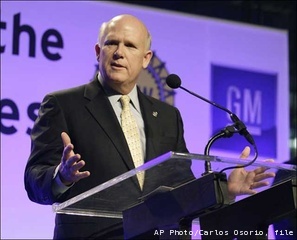 General Motors’ new chief executive, Dan Akerson, has been floating the idea of a special $1-per-gallon federal tax on gasoline in order to make people buy more fuel efficient cars. From Ackerson’s board room viewpoint I’m sure that looks like a good idea. American’s have shown no interest in buying his electric Chevy Volt, so maybe Washington can tax them into it. (Americans have bought millions of small, fuel efficient Japanese cars in the past decade though. How did that happen?)
General Motors’ new chief executive, Dan Akerson, has been floating the idea of a special $1-per-gallon federal tax on gasoline in order to make people buy more fuel efficient cars. From Ackerson’s board room viewpoint I’m sure that looks like a good idea. American’s have shown no interest in buying his electric Chevy Volt, so maybe Washington can tax them into it. (Americans have bought millions of small, fuel efficient Japanese cars in the past decade though. How did that happen?)
Ackerson is not the first person to suggest this. Several leading economists and environmental leaders have suggested raising the gasoline tax, too, as a way of reducing gas consumption in America. It is the stick in the carrot-and-a-stick approach to affecting change. If there is no incentive — see cash for clunkers — show ’em the whip.
What they and Ackerson overlook, though, is poor and middle class families. Somehow they don’t get factored into the equations scrawled across corporate white boards. I’m sure Akerson is right; if we were to hike the gasoline tax by a dollar — or say five dollars — it would almost certainly affect the behavior of millions of Americans: Some wouldn’t able to get to work. Others would have to cut back on staples at the grocery store. School supplies wouldn’t be bought. Summer camp and modest family vacations would be out, and mortgage payments, for those lucky enough to have mortgages, wouldn’t be met. Small businesses across America would almost certainly need to cut back or close. But yes, more fuel efficient vehicles probably would be purchased. Go GM!
The Tea Party is constantly disparaged by America’s upper class for expressing anger. But ideas like this one are a perfect example why average Americans are feeling so much of it. All the bright ideas out of Washington — all the deep thinking from our MBA’s — always seem to come at the expense of the little guy. I, for one, am rooting for him.
Leave a Reply